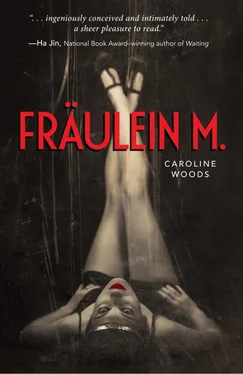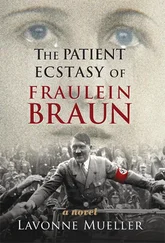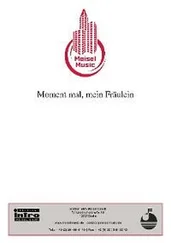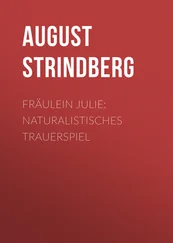Inside the room the blinds were drawn, the light gray. Margaret lay on the bed, her tiny, curled-up legs creating scarcely a bump under the covers. Her breathing sounded shallow. Only her eyes, large and icy blue, registered their arrival.
Anita went to her, kneeling on the floor, as Janeen and Erik hovered on the threshold. Anita felt her sister’s skin, which had a yellowish cast, and found her forehead cool. Out of habit, she tapped the cleft in Margaret’s chin and tried to smile. Margaret continued to breathe in short gasps, a slight rasping sound in her lungs, as Anita felt for her pulse. After a minute she tucked her sister’s wrist back under the blanket.
“Call an ambulance, please,” she said as calmly as she could, and still her daughter and nephew looked as though she’d just told them to prepare to jump. “She will be fine, but I believe she is in shock.” Janeen hesitated as Erik went to make the call, and Anita went to her. “Stay with him, will you, Liebchen ? Give him strength.”
Janeen nodded, firming her jaw. When she’d gone into the living room, Anita closed the door behind them. Despite their fears, despite the fact that neither of them deserved to be part of what had happened here, Anita didn’t doubt they would be all right.
A knitted wool blanket hung on a chair; she brought it and tucked it around Margaret’s shoulders, smoothing back her hair, which was damp at the roots. She brought a glass of water from the nightstand to Margaret’s lips and coaxed her to drink.
“They took him,” Margaret said, her voice nearly inaudible. “The Mossad agents. In the middle of the night. They threw a hood over his head. They will put him on trial. And then they will kill him.”
Doubts sprouted in Anita’s mind, weeds she’d pulled without taking care of the roots. How did she know for certain Margaret was telling the truth? How could she know Margaret hadn’t let Klaus get away, that the pain she felt now wasn’t merely lovesick grief?
Doubts would always be there. But the ambulance would arrive soon. They would not have much more time together. Anita put a hand on Margaret’s forehead.
“It cannot have been easy for you to do,” she murmured.
“No. In a sense it was easy. It is what he deserved.” Margaret’s voice sounded high, nasal; her hearing aid sat on the nightstand. “But he cursed me, you should have heard the way he cursed me. He promised he’d tell them everything I did. And the agents said…” Margaret’s body convulsed in weak coughs. “They saw my records, from the SS,” she croaked. “If I hadn’t cooperated, giving them Klaus, they could have…”
“But you did cooperate. You gave them Klaus.”
“You didn’t believe I would.” Margaret’s eyes fell closed. Her voice turned airy. “It is what he deserved. It is what I deserve.”
“Hush,” said Anita, a lump in her throat.
After this they did not speak. Anita went to the window and twisted the cord to make the blinds tighter, darkening the room. Then she came to the bed and, after waiting a moment with one knee on the mattress, she slipped under the covers beside her sister.
It would only be for a minute. The paramedics were on their way. Anita felt herself struggling to hold something inside, something that threatened to burst from her chest.
A soft knock sounded at the door. Then one of the kids whispered something to the other, and she heard them retreat.
The bed felt narrower than she’d expected. She found herself pressed against Margaret’s back, her lips touching the ends of blond hair that smelled of milk and honey. Anita closed her eyes. She felt the blankets shift, and she peeked to find Margaret facing her now, eyes shut. Her face had regained some of its color. Their breathing fell into a rhythmic pattern, their ribs expanding and contracting in unison. Under the covers Margaret’s feet tickled Anita’s shins, the skin freezing cold. She left her toes there, borrowing Anita’s warmth.
When Anita smiled, her tears ran into her mouth. She tasted salt. Poor Grete—she never did like thunderstorms. As soon as she could toddle, she would climb from her trundle into Berni’s bed in their room in the attic, under the eaves.
Sirens were approaching. She could hear them whining up the avenue. “Tell me a story,” Berni said, though it was usually she who spoke while Grete listened, and she knew neither of them had anything left to say. But she watched the corners of Grete’s mouth lift—lines, now, running from her nose to the corners of her lips—and so she said it again. “Tell me a story.”
Grete smiled back at her. It was enough, it seemed, just to say the words.
Writing a book set in another time and another country can feel impossible. I owe a great deal of gratitude to the many people who helped me find my way in the dark.
Thank you to Shannon Hassan, my amazing, tenacious agent, and everyone at Marsal Lyon Literary Agency for finding the perfect home for Berni and Grete. Thank you to Benjamin LeRoy, Heather Padgen, and everyone at Tyrus Books and Adams Media for making this novel the best it could be. I could not be happier to work with all of you.
I never could have done this without my professors in the creative writing program at Boston University: Leslie Epstein, Xuefei Jin, and Allegra Goodman. Thank you for believing in these characters and in me.
To my Sheilas—Jordan Coriza, Joseph Fazio, Kathleen Foster, Jill Maio, Jessica Ullian, Farley Urmston, and Jennifer Cacicio—thank you for reading this so many times. Thank you also to: Stacy Mattingly, Lauren Sorantino, and Bekah Stout for offering your fresh eyes; Kate Hollander, for sharing your extensive knowledge of the Weimar Republic; Quinn Slobodian and Michelle Sterling, for letting me text you at odd hours with German usage questions; Grayson Mills, for teaching me about teenage life in South Carolina; and Daphne Kalotay, for being a tremendous friend and mentor.
Jim and Julie Kerr, thank you for believing in me and for raising an incredible son.
To my four fantastic grandparents: Mom-Mom and Pop-Pop Woods, thank you for the lovely, much-needed respites in Florida, and Nonna and Poppy Apostolico, danke schön for taking me to Germany twice. Nonna, I will never forget sharing beer and schnitzel with you in Alexanderplatz. Who knows us?
Stephanie and Michael: I love you even more than Berni loves Grete, and I feel very fortunate that our story is much simpler. Consider me your sidekick for life.
To my parents, who didn’t bat an eye when I said I’d rather be a novelist than go to law school: thank you for your faith in me. My father, Jim, has taught me so much about language, especially the German I needed here. And my mother, Susan, gave me the priceless gift of a love of reading. Mom, I can never thank you enough for always surrounding me with books.
Camille: it’s you and me, kid—we did this together! You are my shining star. I am so lucky to be your mommy.
And to Colin, who has believed this would happen from the time it seemed, to me, a distant possibility: I am grateful for you every single day. Thank you for supporting my dream. I love you.
Advance praise for Fräulein M. :
“Debut novelist Woods is a skilled constructor of scenes that propel readers forward and lay bare the difficulties of living in complicated times… Readers will be moved by the Metzger sisters.”
—Booklist
“Caroline Woods shows tremendous skill in portraying these characters. It is a big story ingeniously conceived and intimately told, full of feeling and revealing details. Fräulein M . is a sheer pleasure to read.”
—Ha Jin, National Book Award and PEN/Faulkner award winning author of
Waiting and
War Trash
“This evocative tale, finely told, reminds us of the fragility of family bonds and the compromises made in the name of survival. Readers will be moved by the conflicts in ideology, loyalty, and trust that Woods brings to life in these pages.”
Читать дальше












